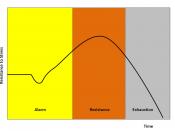The concept of stress has been researched for many years. Stress research has can be traced to two theorists which have different approaches to the field of stress research. Hans Selye based his theory of systemic stress on physiology and psychobiology. Richard S. Lazarus bases his theory of psychological stress on cognitive psychology. Lazarus defines psychological stress as a relationship with the environment that the person appraises as significant for his or her well being and in which the demands tax or exceed available coping resources (Lazarus and Folkman, 1984). Selye defines this stress as a state manifested by a syndrome which consists of all the nonspecifically induced changes in a biologic system (Selye, 1976).
Selye observed that patients suffered physical symptoms not caused directly by their disease or by their medical condition (Berczi, 2004). This physiological response is known as the general adaptation syndrome. The general adaptation syndrome has three stages alarm reaction, resistance, and exhasution.
The alarm reaction comprises an initial shock phase which exhibits autonomic excitability, an increased adrenaline discharge, and gastro-intestinal ulcerations; and subsequent counter shock phase which marks the initial operation of defensive processes and is characterized by increased adrenocortical activity. During this stage the body mobilizes itself to fight or to flee from a threatening stimulus. The second stage which is resistance takes place if the noxious stimulation continues. In this stage the symptoms of the alarm reaction disappear which indicates the organism's adaptation to the stressor. As resistance to the noxious stimulation increases, resistance to other kinds of stressors decreases at the same time. In which the body mobilizes its resources to achieve equilibrium despite the continued presence of the stressor. The final stage is exhaustion in which symptoms of the first stage reappear, but resistance is no longer possible.
There are...


